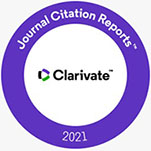Managing customer service through artificial intelligence-driven chatbot systems in Islamic Banking institutions
DOI:
https://doi.org/10.26740/al-uqud.v9n2.p143-151Keywords:
Chatbot, Islamic banking, Bank Syariah Indonesia, Operational Efficiency, Digital innovationAbstract
This study examines the implementation of chatbots in Bank Syariah Indonesia (BSI) to enhance customer service in the Islamic banking sector. This study used a literature review in collecting and analyzing the secondary data in the form of papers downloaded from Google Scholar, Scispace, DOAJ, and Scopus websites. There were 26 papers gathered as samples of this study from 2015-2024. The data were analyzed through systematic data reduction, presentation, and conclusion-drawing. The findings show that deploying chatbots can significantly improve service delivery by reducing operational workloads through quick replies to repetitive customer inquiries. Chatbots serve as an innovative solution that handles routine questions swiftly, thereby increasing efficiency and allowing staff to focus on more complex tasks. Their continuous, round-the-clock availability further enhances customer engagement and experience by providing immediate assistance at any time, eliminating extended waiting times for information. Additionally, the chatbot’s ability to interpret customer interactions provides valuable insights into customer behavior and preferences. Such insights enable BSI to better understand about customer needs and identify usage patterns of Sharia-compliant banking products. However, the implementation of chatbots in Islamic banking also requires careful consideration of Islamic ethics. The development of AI must integrate maqasid al-shariah values such as justice, transparency, and data protection to ensure alignment between technological efficiency and Shariah principles.
References
Anggraeni, R., & Elan Maulani, I. (2023). Pengaruh Teknologi Informasi Terhadap Perkembangan Bisnis Modern. Jurnal Sosial Teknologi, 3(2), 94–98. https://doi.org/10.59188/jurnalsostech.v3i2.635
Aziz, A. (2015). Pemanfaatan Teknologi Informasi dalam Pengembangan Bisnis Pos. Buletin Pos Dan Telekomunikasi, 10(1), 35. https://doi.org/10.17933/bpostel.2012.100104
Creswell, J. W., & Poth, C. N. (2016). Qualitative inquiry and research design: Choosing among five approaches. Sage publications.
Desky, H., & Maulina, I. (2022). Digital transformation in Islamic banking. International Journal of Multidisciplinary Research and Analysis, 5(12), 3616–3622.
Fidiyanti, F. Madiistriyatno, H. (2023). Analisis Strategi Pengembangan Bisnis Menggunakan Teknologi Artificial Intelegence. Journal of Comprehensive Science (JCS), 2(7), 1994–2001. https://doi.org/10.59188/jcs.v2i7.425
Fitria, T. N. (2025). Islamic Banking Digitalization: Challenges and Opportunities in the Era of Industrial Revolution 4.0. JIEI: Jurnal Ilmiah Ekonomi Islam, 11(1), 1–19.
Ganthika, D., & Wahdiniwaty, R. (2020). The Effect of Customer Value on Customer Loyalty at Bandung Tourist Location. Proceedings of the International Conference on Business, Economic, Social Science, and Humanities – Economics, Business and Management Track (ICOBEST-EBM 2019), 112, 110–112. https://doi.org/10.2991/aebmr.k.200108.026
Garg, P., Sivarajah, U. (2021). Measuring the perceived benefits of implementing blockchain technology in the banking sector. Technological Forecasting and Social Change, January. https://doi.org/DOI:10.1016/j.techfore.2020.120407
George, A. L., & Bennett, A. (2005). Case studies and theory development in the social sciences. mit Press.
Hamadou, I., & Jallow, M. S. (2024). Unleashing the power of artificial intelligence in Islamic banking: A case study of Bank Syariah Indonesia (BSI). Modern Finance, 2(1), 131–144.
Hidayati, T., & Nasution, F. (2020). Pengaruh Fitur Chatbot Aisyah ( Asisten Interaktif Mandiri Syariah) Terhadap Kualitas Pelayanan Nasabah. Jurnal BanqueSyar’i, 6, 81–88. http://jurnal.uinbanten.ac.id/index.php/bs/article/view/2397
Jain, V. & Ambika, A. (2023). Artificial intelligence in customer service: An introduction to the next frontier to personalized engagement. In Artificial Intelligence in Customer Service: The Next Frontier for Personalized Engagement (pp. 1–11). Springer.
Jakšič., M., & M Marinč. (2019). Relationship banking and information technology: the role of artificial intelligence and FinTech. Risk Management, 1(21). https://doi.org/10.1057/s41283-018-0039-y
Kamal, K. (2022). Chatbot: Panduan Untuk Pemula dan Pemilik Bisnis di Indonesia. Botika.
Khan, S., & Rabbani, M. R. (2021). Artificial intelligence and NLP-based chatbot for islamic banking and finance. International Journal of Information Retrieval Research (IJIRR), 11(3), 65–77.
Leo, M., Sharma, S., & Maddulety, K. (2019). Machine learning in banking risk management: A literature review. Risks, 1(7). https://doi.org/https://doi.org/10.3390/risks7010029
Malik, R. & Mustika, M. (2024). Artificial Intelligence and Islamic Law: Ethical Implications and Fiqh Fatwas in the Digital Age. Journal of Family Law and Islamic Court, 3(2), 128–143. https://doi.org/10.26618/jflic.v3i2.16546
Mikalef, P., & Gupta, M. (2021). Artificial intelligence capability: Conceptualization, measurement calibration, and empirical study on its impact on organizational creativity and firm performance. Information and Management, 58(3), 103434. https://doi.org/10.1016/j.im.2021.103434
Pratiwi, D., & Hutasuhut, I. P. (2019). Pengaruh E-Service Quality dan Perceived Value Terhadap E-Satisfaction yang Berdampak pada E-Loyalty Mataharimall.com (Studi pada Pelanggan MatahariMall.com Tahun 2017). Jurnal ISIP Jurnal Ilmu Sosial Dan Ilmu Politik, 1(1). https://doi.org/10.36451/j.isip.v16i1.20
Qian, C. & Xiong, J. (2023). Can AI chatbots help retain customers? Impact of AI service quality on Customer loyalty. Internet Research. https://doi.org/10.1108/INTR-09-2021-0686
Schiffman, L. G., & Wisenblit, J. (2015). Consumer Behavior 11th Edition Global Edition. Pearson Education Limited.
Shalhoob, H. (2025). The role of AI in enhancing shariah compliance: Efficiency and transparency in Islamic finance. Journal of Infrastructure, Policy and Development, 9(1), 11239. https://doi.org/10.24294/jipd11239
Suhartanto, D. & Amin, H. (2022). Millennial loyalty towards artificial intelligence-enabled mobile banking: evidence from Indonesian Islamic banks. Journal of Islamic Marketing, 13(9), 1958–1972.
Tjiptono, F. (2016). Pemasaran jasa. Jakarta: Gramedia Pustaka Utama.
Triyanti, D. & Iqbal, M. (2021). Peran Layanan Mobile Banking dalam Meningkatkan Kepuasan dan Loyalitas Nasabah Bank Syariah. Jurnal Muhammadiyah Manajemen Bisnis, 2(1), 1–12.
Downloads
Published
How to Cite
Issue
Section
License

This work is licensed under a Creative Commons Attribution 4.0 International License.
CC BY 4.0 Abstract views: 745
,
Abstract views: 745
, PDF Downloads: 250
PDF Downloads: 250








